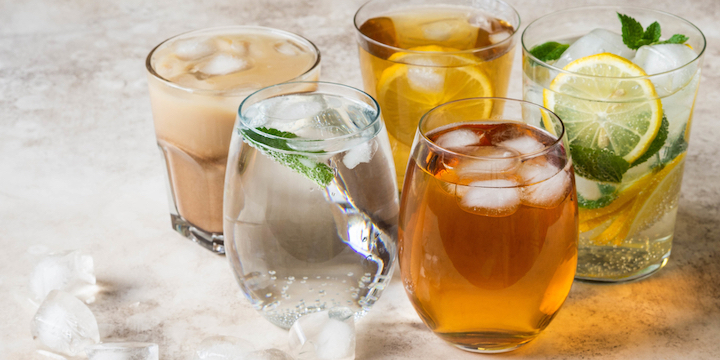“fake friends “. This is how the Consumption Housing Environment Association (CLCV) qualifies fruit juices and iced teas. In a press release published on April 27, this association for the defense of consumers asks the authorities “better supervision of nutritional claims and other positive mentions“on these drinks. Because behind the appealing names lie a lot of sugar and a low nutritional value.
158 drinks analyzed
CLCV has scrutinized the composition of 158 drinks sold by mass distribution: fruit juices, smoothies, fruit drinks, flavored water or even iced teas and infusions recorded between December 2020 and March 2021 in six retail chains. been analyzed.
“Contrary to popular belief, many of these drinks have a poor nutritional profile, especially because they are very sweet.“, warns the association in a press release.
Read also: Refreshing and sugar-free drinks for the summer!
Drinks classified “D”
56% of them are even classified “D” in the Nutri-score assessing the nutritional quality of consumer products. This scoring system ranges from “A”, the best grade, to “E”, the lowest grade.
“24% are rated C, 14% B and 6% are rated E“, details the CLCV, which specifies that”no drink is in the first class of the Nutri-Score, water being the only drink rated A“. Only 35% of the drinks noted display their Nutri-score.
Rich in additives, low in fiber
To make matters worse, drinks with a better Nutri-score, therefore less sweet, “are filled with additives“, because “manufacturers compensate for the small amount of sugar and fruit juice with sweeteners and flavorings“, according to this study.
Even fruit juices, which have the highest fruit content, remain “very sweet and low in fiber“and”cannot replace in the diet one of the five servings of fruits and vegetables recommended per day“, recalls the CLCV.
Stop positive mentions
Finally, the association notes that 91% of the drinks studied “make claims or statements about their antioxidant or conditioning properties on their packaging“. Not fake but who”can mislead the consumer“.
This is for example the case of an iced tea “Without colouring“but which contains”all other types of additives“, from a smoothie”antioxidant” But “rated D on the Nutri-Score scale“, or a fruit juice produced in France but not mentioning the origin of the fruits used, details the CLCV. It therefore wishes that the drinks classified D or E can no longer use the”nutritional claims“or” aother positive mentions“.
 Cherry tomatoes contaminated with salmonella: 92 sick and 1 dead
Cherry tomatoes contaminated with salmonella: 92 sick and 1 dead  A better coaching method can make a person grow
A better coaching method can make a person grow  What is the method to prevent diabetes in children?
What is the method to prevent diabetes in children?  What are the effective factors in causing stomach ulcers?
What are the effective factors in causing stomach ulcers?  Why do embarrassing memories seem to appear at night?
Why do embarrassing memories seem to appear at night?  The amazing link between SARS-CoV-2 infection and newly started diabetes
The amazing link between SARS-CoV-2 infection and newly started diabetes  WHO says monkey pox is not a global emergency right now
WHO says monkey pox is not a global emergency right now  Single cell RNA sequencing uncovers new mechanisms of heart disease
Single cell RNA sequencing uncovers new mechanisms of heart disease  Hepatitis of unknown origin: 3 new deaths and 228 cases worldwide
Hepatitis of unknown origin: 3 new deaths and 228 cases worldwide 